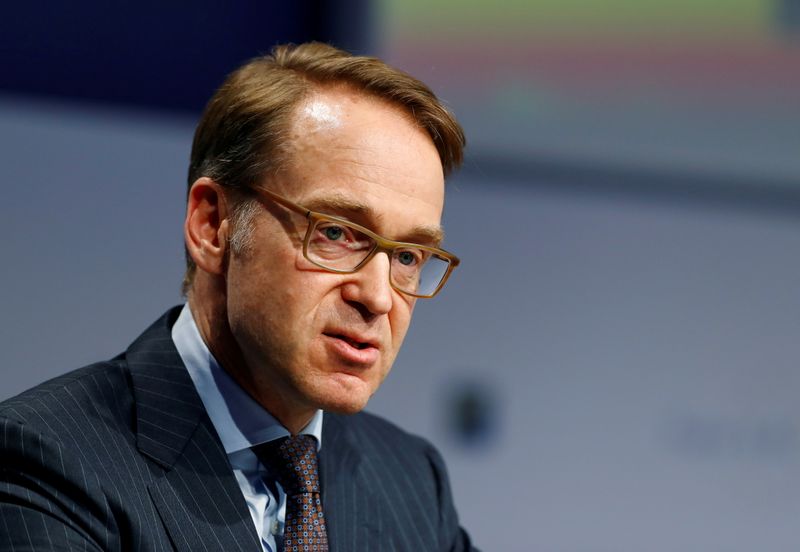FRANKFURT (Reuters) - Germany's Social Democrats, the senior partner in the three-way coalition that is forming a new government, are expected to pick a new head of the Bundesbank, the national central bank, by the end of this week.
The Social Democrats, the Greens and the Free Democrats have struck a deal that will see Social Democrat Olaf Scholz replace conservative Angela Merkel as chancellor after 16 years.
Bundesbank President Jens Weidmann steps down on Dec. 31, five years before the official end of his second term, after 10 years of largely fruitless opposition to the European Central Bank's easy-money policies.
Below is a list of potential candidates to take over from him:
ISABEL SCHNABEL
Schnabel is a member of the European Central Bank's Executive Board, which would make a switch to the Bundesbank unprecedented.
In her first two years as an ECB board member, Schnabel has broken the mould of German opposition to bond purchases and negative interest rates and has defended the ECB from critics in her native country.
She has recently struck a hawkish note by saying inflation might turn out to be higher than the ECB currently expects.
JOACHIM NAGEL
Nagel is a Social Democrat who worked at the Bundesbank for 17 years, rising through the ranks to become a board member before stepping down in 2016.
At the German central bank he was responsible for markets and information technology and would not routinely comment on monetary policy.
He is currently the deputy head of the banking department of the Bank for International Settlements, which he joined in 2020 after a four-year spell at German state bank KfW.
He holds a degree in economics.
MARKUS BRUNNERMEIER
The Princeton professor is perhaps the most international candidate on the list, having done most of his research and teaching in Britain and the United States.
He has co-authored scholarly papers with the ECB's chief economist Philip Lane, including one that championed the creation of a "synthetic" safe asset for the euro zone and got a cold reception from the Bundesbank.
In a 2017 book, "The Euro and the Battle of Ideas", Brunnermeier and co-authors said the bloc's core problem resided in a conflict between Germany's focus on rules and France's preference for flexibility, and called for the creation of a fully fledged banking union.
JAKOB VON WEIZSAECKER
Weizsaecker has been the chief economist of the German Ministry of Finance under Scholz.
He was a member of the European Parliament for the Social Democrats between 2014 and 2019, sitting on the Committee on Economic and Monetary Affairs.
A prominent member of an aristocratic family, he is a pro-European who is well regarded by the German centre-right.
JOERG KUKIES
As Germany's deputy finance minister, Kukies has been Scholz's right-hand man.
He has a PhD in finance from the University of Chicago and worked for Goldman Sachs (NYSE:GS) for 17 years before joining the government in 2018.
He was criticised for his role in the Wirecard https://www.reuters.com/article/us-germany-wirecard-inquiry-insight-idUSKBN2B811A scandal, for sending Scholz a nine-page memo in which he played down concerns about the payment company and outlined a plan to rescue it with funds from state bank KfW.
MARCEL FRATZSCHER
Fratzscher is the most "dovish" candidate on the list, having backed the ECB's ultra-loose monetary policy and called for more fiscal spending in Germany.
He has told Handelsblatt the current inflation rate is "nothing to worry about" and that the ECB should not raise rates in response.
A former European Central Bank economist, he teaches macroeconomics and finance at Berlin's Humboldt University and runs the DIW Berlin think-tank.
CLAUDIA BUCH
Buch has been the Bundesbank's vice-president since 2014 after a two-year stint on the German Council of Economic Experts.
The 55-year old former university professor accompanies Weidmann to meetings of the ECB's Governing Council.
But she has largely steered clear of the monetary policy debate in public, focusing instead on issues relating to financial stability.
JENS ULBRICH

The Bundesbank's chief economist has worked for the German central bank since 2005 after a five-year stint as the general secretary of the German Council of Economic Experts.
The 52-year-old economist is active on Twitter (NYSE:TWTR) but has not expressed views about monetary policy in public, mainly explaining the ECB's decisions and commenting on the economic outlook.